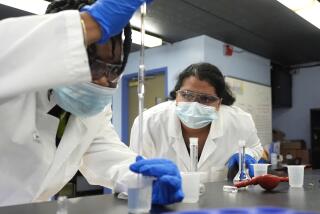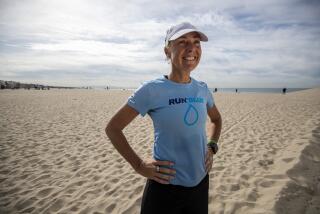Young Activists Join Water Forum
MEXICO CITY â Of the thousands of entrepreneurs, protesters, do-gooders and policymakers here for the World Water Forum, few can match the passion of Suresh Baral.
Infants and young children were dying in Baralâs village in Nepal of intestinal diseases spread by bad hygiene, primitive sanitation and lack of clean water, as they do by the hundreds of thousands each year throughout the Third World.
So 13-year-old Suresh and his friends started going door-to-door to save some of them.
He was among half a dozen children from Laos, Bangladesh, Colombia, Kenya and Nigeria who spoke Friday at the World Water Forum about their work back home. They and two dozen others were flown here by UNICEF, which provides funding and advice for their projects.
The weeklong forum has drawn about 11,000 participants from more than 100 countries, organizers said.
âWe were telling each person that they should wash their hands after touching anything dirty, and each house should have a permanent toilet,â said Suresh, who chairs the sanitation club at his school and wants to be a physician.
At first, the campaign fell flat. Old habits, he said, were hard to break, especially with the lecture coming from kids.
âWe got scolded for being young people trying to give a big message,â Suresh said, speaking through an interpreter.
Little by little, though, he and his pals won over the village. Of the 165 households in Pumdi Bhumdi, nearly two-thirds have added permanent toilets.
âWeâre trying to make our community a model,â he said.
Children younger than 5 are most vulnerable to the risks of unclean water. They make up 90% of annual fatalities from malaria and water-related illnesses.
About a billion people live without enough potable water; an additional 2.6 billion lack basic sanitation, according to the World Health Organization and the United Nations.
Thereâs plenty of water. Over millions of years, the Earth hasnât lost a drop, said Avinash C. Tyagi of the Swiss-based World Meteorological Organization.
Unlike petroleum, the worldâs water supply can be reused indefinitely.
âThe problem is management,â Tyagi said, or keeping water clean and available, which is the focus of the water forum.
How best to do that is a matter of debate. Thousands of people marched here Thursday to protest the privatization of water services in countries where the government cannot provide healthy supplies.
âWe are looking at securing water as a human right, improving peopleâs access to safe water and doing that in a way that doesnât allow it to be bought and sold,â said Kathryn Mulvey, executive director of Corporate Accountability International, a Boston-based nonprofit group.
The multibillion-dollar water business -- digging, damming, desalinating, draining, pumping, purifying, testing and storing -- was also well represented. The forum, being held at a convention center overlooking a racetrack, mixed the brassy feel of an auto show with the knit-brow sobriety of an ecology summit.
There were dozens of seminars on water policy, as well as a Jose Cuervo tequila booth with free drinks. Women in Europe for a Common Future shared floor space with the come-hither convention girls of Rotoplas, a Mexican water tank firm.
The youngest forum representatives werenât about to be left out of the discussion, commanding an hourlong news conference Friday.
âChildren have ideas and can come up with solutions,â said Ibrahim Adamu, 15, president of Nigeriaâs Childrenâs Parliament.
Dolly Akhter, 15, of Bangladesh leads a group of girls who teach hygiene in the capital, Dhaka. She pointed to the gathered media before leaving.
âWeâre here to see what other children are doing about water in their own countries,â she said. âNow you can spread the word to more children.â
More to Read
Sign up for Essential California
The most important California stories and recommendations in your inbox every morning.
You may occasionally receive promotional content from the Los Angeles Times.










